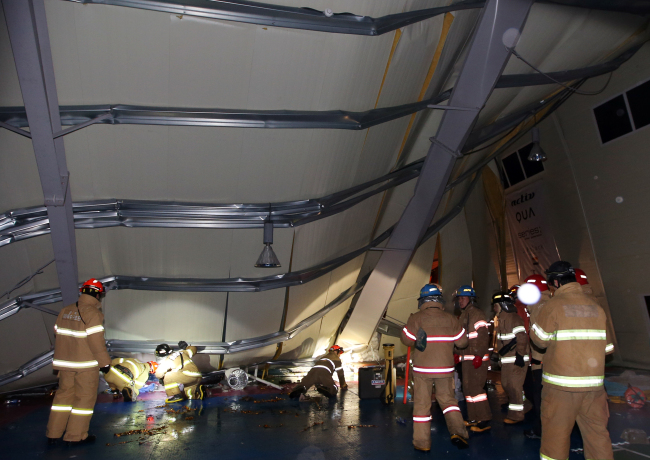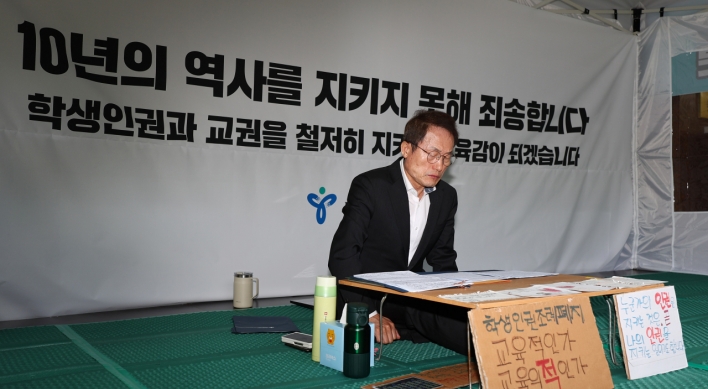
As South Korea mourned the loss of 10 people who were killed when a resort building collapsed in Gyeongju, the government said Tuesday it planned to investigate the tragic accident to identify its cause.
“Speculation is flying over the cause of the accident, but we are looking at multiple possibilities, including heavy snow and possible flawed construction of the building,” said Lee Jae-yul, the head of Safety Management Headquarters at the Ministry of Security and Public Administration.
Late Monday, a gymnasium at a resort in Gyeongju, Gyeongsang Province, collapsed under the weight of heavy snow with 565 freshmen from the Busan University of Foreign Studies inside. Nine students and one event organizer were killed and more than 100 people were injured,
According to Lee, the building was finished in 2009, construction of which raises the question of why a facility barely 5 years old folded like paper.
The area had received more than 50 centimeters of accumulated snow in the previous week, and the auditorium in question was built using a pre-engineered metal building system that makes it more vulnerable to heavy loads. This gymnasium, however, was only the building in the area using that technique that collapsed.
“Snow is not the fundamental problem. Fifty centimeters of snow would only amount to 150 kilograms per square meter. A normal roof should hold at least 300 kilograms,” Cho Won-cheol, a professor at the School of Civil and Environmental Engineering at Yonsei University, said in a radio interview.
He said the real problem was in the building’s construction, adding that one could tell from a glimpse that its rafters were very weak.
Buildings using the PEB technique require sturdy rafters because they have no pillars. In addition, the steel frames that are put between the panels on PEB buildings should have been thicker and stronger, he said.
Poor management by the resort appears to have worsened the situation. Most of the snow on the rooftop, the possible cause of the cave-in, was not shoveled. The combined weight of the snow is estimated at over 148 tons.
According to the North Gyeongsang provincial government, the collapsed gymnasium never had an official safety inspection by an outside organization since its completion. The regulation only requires buildings 5,000 square-meters or bigger to go through a safety inspection, which exempt the resort building from regular inspection.
An official from the provincial government said in such a case, the owner of the facility is responsible for conducting inspections.
There was also poor provision of escape routes. Once the roof started to collapse, students rushed toward the only exit, which was not big enough to cope with the sudden stampede of more than 500 students.
“A building of that size should have had at least three exits,” said Cho.
The heavy snowfall in the area had hindered the rescue team from reaching to the building quickly.
“The site was in a remote area that was 500 meters above sea level, and the emergency vehicles had difficulty reaching it because of the heavy snow,” Lee said.
Some faculty members of the university suspected that the students were forced to use the cheaper place because of a conflict between the student council and the school authority over the venue, which was being used for a welcoming event for new students. One professor and two members of the school staff reportedly attended.
“The welcoming events were usually supported by the school, so they are held at better venues and all faculty participates. But this year, the university did not provide financial support,” a professor from the university wrote on Twitter.
The school denied allegations that the resort was chosen for financial reasons.
By Yoon Min-sik (minsikyoon@heraldcorp.com)




![[KH Explains] No more 'Michael' at Kakao Games](http://res.heraldm.com/phpwas/restmb_idxmake.php?idx=644&simg=/content/image/2024/04/28/20240428050183_0.jpg&u=20240428180321)













![[Herald Interview] Mistakes turn into blessings in street performance, director says](http://res.heraldm.com/phpwas/restmb_idxmake.php?idx=652&simg=/content/image/2024/04/28/20240428050150_0.jpg&u=20240428174656)
